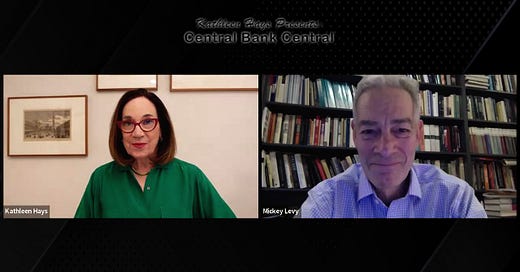As Donald Trump prepares to turn the nation’s economic policy framework on its head by with aggressive, game changing proposals, the race is on to figure out what the impact of all of this will be limited
Enter Mickey Levy. He has spent his career as a macroeconomist - from government to Wall Street to top think tanks — analyzing how monetary and fiscal policies affect the U.S. and global economy, and financial markets around the world.
Mickey agrees with the current majority view among economists that Tariffs are like tax on the economy and will have an unmitigated negative impact on growth. But he is adamant that this will be offset by Trump’s plan to extend his to extend his first term tax cuts and embark on widespread deregulation at the federal level that will boost business sentiment and investment.
“Four Pillars” of Trumponomics Will Have “Fairly Neutral” Impact on Economy as Negative Impact of Tariffs Is Offset by Boost from Tax Cut Extensions
00:00:49:16 - 00:01:20:23
Trump has proposed really four pillars in his economic policies to raise tariffs and be tough on China and to extend the tax cuts that were put in place in 2017 to deregulate the economy. And those three pillars were all part of his first terms, economic policies.
And then the fourth pillar is, is massive deportation of immigrants. So those are the those are the basic four pillars with a few bells and whistles and a lot of bluster around them.
00:01:49:09 - 00:02:37:16
The summing up…is fairly neutral, a slight negative with the negative from tariffs, which will reduce consumption and business investment, offset largely by the real benefits of deregulation and the extension of the tax cuts, which will raise expectations for businesses that will lead to more expansion plans and more employment tariffs.
Trump Tariffs Like Tax: Businesses Pay Government $330 a Year
00:02:37:18
“They are negative because these… effectively are a tariff is a tax when when businesses import goods, they will be paying the government. And so if we put this into context, the U.S. imports about 3.3 trillion in goods and services” so a 10% tariff on that would mean businesses would be paying to the government about $330 billion per year, which comes out to a little less than one and a half percent of GDP. The largest portion of those tariffs incurred by businesses will be passed on to consumers in the form of higher prices. Lops will be passed on to other businesses that are importing durable goods used in production processes.”
Deregulation Will Boost Business Confidence, Expansion, Hiring
00:04:44:02 - 00:05:25:18
”Dialing back those regulations would definitely be a boost to business confidence in and this would lead not just to businesses wanting to expand expansion plans, but it would also lead to more hiring. And you know… we have to go back to the first Trump term and you can clearly see that the deregulatory environment was was very positive and positively received tax cuts.
Expectations that Trump Q1 Tax Cuts Won’t Expire Also “Distinct Positive”
00:07:58:06 - 00:08:40:00
“If businesses actually actually expected taxes were going to go up sharply and households expected taxes were going to go up sharply, then that would that would temper back their their spending and investment. But the expectation that they won't go up is a distinct positive. And so, once again, if we take that positive on this third pillar of extending taxes and the deregulation, both of which were quite positive in the early parts of of Trump's first term, those will largely offset the negatives from the tariffs.”
Migrant Deportations is Fourth Pillar of Trump Economic Proposals
— Short-term impact won’t be that large, is major risk because of uncertainty, baseline is there will be fewer than expected
As for the inflationary impact of tariffs Mickey noted that they will have a one-time impact as tariffs are imposed on countries and specific U.S. imports, and this will reduce the impact they have on Fed policy decisions. And that financial markets have already priced this in.
We covered a lot more ground so dive in now and hear and see what he has to say.
Dr. Mickey D. Levy is a macroeconomist who uniquely analyzes economic and financial market performance and how they are affected by monetary and fiscal policies. Dr. Levy started his career conducting research at the Congressional Budget Office and American Enterprise Institute, and for many years was Chief Economist at Bank of America, followed by Berenberg Capital Markets. He is a long-standing member of the Shadow Open Market Committee and is also a Visiting Scholar at the Hoover Institution at Stanford University.
Dr. Levy is a leading expert on the Federal Reserve’s monetary policy, with a deep understanding of fiscal policy and how they interact. He has researched and spoken extensively on financial market behavior, and has a strong track record in forecasting. Dr. Levy’s early research was on the Fed’s debt monetization and different aspects of the government’s public finances. He has written hundreds of articles and papers for leading economic journals on U.S. and global economic conditions, and has been an active voice on how financial markets are influenced by monetary policy. He has testified frequently before the U.S. Congress on monetary and fiscal policies, banking and credit conditions, regulations, and global trade, and is a frequent contributor to the Wall Street Journal, Bloomberg, and other media.
He is a member of the Council on Foreign Relations and the Economic Club of New York, and has previously served on the Panel of Economic Advisors to the Federal Reserve of New York, as well as the Advisory Panel of the Office of Financial Research.
Dr. Levy holds a Ph.D. in Economics from University of Maryland, a Master’s in Public Policy from U.C. Berkeley, and a B.A. in Economics from U.C. Santa Barbara.












Share this post